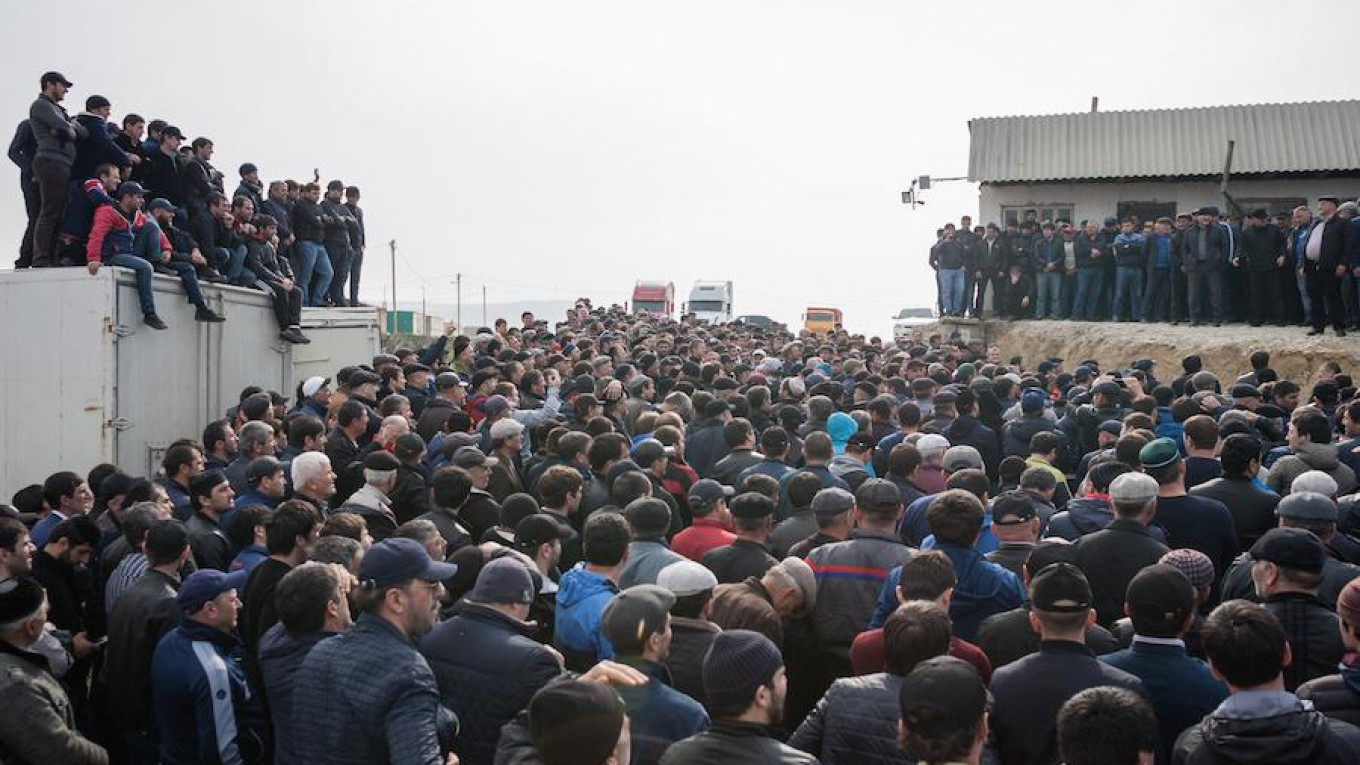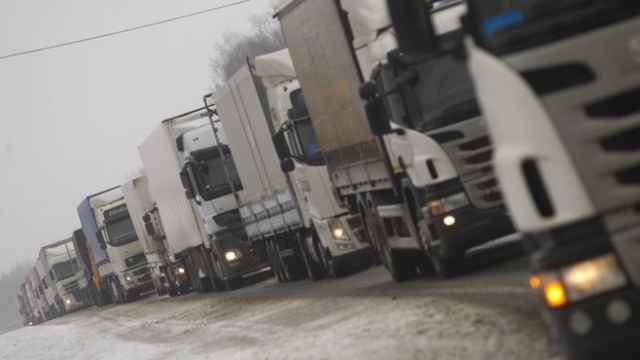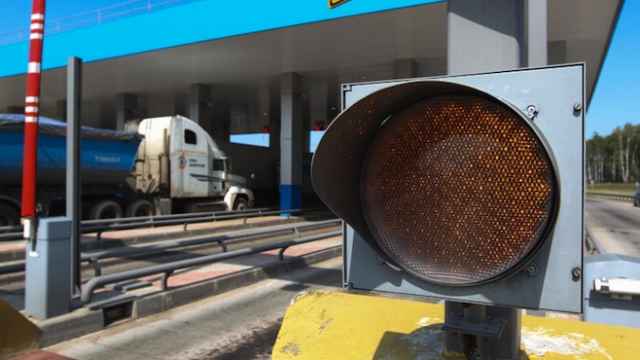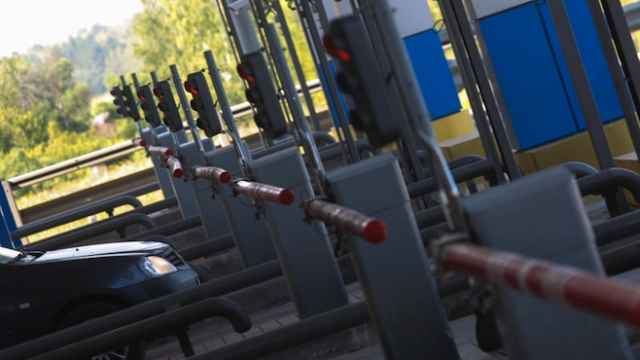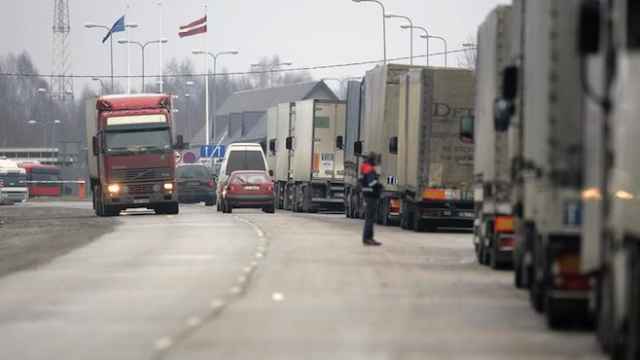For over a thousand kilometers, the Kavkaz highway meanders south from Russia’s Krasnodar region through the North Caucasus until it reaches the border with Azerbaijan.
Аbout 40 kilometers before Makhachkala, the bustling capital of the Dagestan republic, a highway exit leads to the village of Manas on the Caspian Sea. A roadside petrol station, cafes with names like “Bon Appetite,” and a large parking lot offer passing drivers a place to recover.
But since late March, Manas has transformed from a sleepy coastal village. Angry truck drivers—from dozens to thousands at a time—have staged a sit-in there under the watchful eyes of police. Tensions escalated this March when Russia’s National Guard made an appearance on the scene in full riot gear, threatening to bring the standoff to a head.
“People were surrounded,” says Rustam Mallamagomedov, the unofficial coordinator of the protests in Dagestan. “Everybody was very tense.” In an earlier comment, he compared the situation to being “on the brink of revolution.”
The National Guards have since left, but the truckers say they will stay until the electronic road tax they are protesting is scrapped. Platon is a tax on trucks heavier than 12 tons per kilometer they travel. The tax, which could eat up to half of the truckers’ income, has sparked some of the most enduring protests across Russia in recent years.
Before Platon was first introduced in November 2015, truckers across the country joined in strikes, rallies and road blockades. Ahead of a planned tax hike on April 15, the protest reignited across the country.
There have been large roadside rallies and strikes in at least 20 regions since, and 40 percent of Russian truckers have laid down their work, says Andrei Bazhutin, head of the United Truckers of Russia (OPR) group. Mallamagomedov, the Dagestani coordinator, says nearly 100 percent of Dagestani truckers have joined the strike.
“Why are we, the Russian people, suffering today?” one of the truckers, Abdurashid Samadov, tells a crowd in dark caps and leather jackets, in one widely circulated video uploaded to YouTube. “Can you not see we’re being squeezed? It is out of desperation that we have come out!”
Both in numbers and ferocity, Dagestan has emerged as the unlikely epicenter of the Platon protest. The North Caucasus republic typically makes the headlines for its conflict with militant Islamists or as a bastion of Kremlin loyalty. (In 2016 parliamentary elections were marred by accusations of vote rigging—89 percent voted for the ruling United Russia party.)
But according to Konstantin Kazenin, a senior researcher at the Academy of National Economy and Public Administration (RANEPA), Dagestan has a strong tradition of small protests, usually over land rights and the work of law enforcement.
Platon has hit the region particularly hard, he says. Wedged between the Russian interior and Azerbaijan and Iran, Dagestan is a busy transit point for the heavy transport that Platon targets.
Many Dagestanis either work as truckers or are dependent on the trade. “For local farmers from Dagestan’s interior, the truckers are the only way to get their goods, such as fruit and vegetables, to market in other Russian regions,” says Kazenin.
Dagestan is also among Russia’s poorest regions. The truckers say they simply cannot afford another tax on top of existing transport and fuel levies. “We are paying three times for the same road,” says Mallamagomedov.
His argument has reverberated throughout Russia’s trucking community, which is already pressed amid an economic downturn, says the OPR group’s Bazhutin. On average, they travel around 100,000 kilometers per year, and with the current Platon rate set at 1,90 rubles per kilometer, the bill could slash truckers’ earning by half.
“Platon is the last drop,” says Bazhutin. “It’s reaching a point that we can’t even pay our utility bills anymore.”
While officials say the tax hike will pay for road repair, truckers believe it is a ploy to line the pockets of Russia’s richest. The company collecting the tax is partly owned by the son of Arkady Rotenberg, a long-time friend of Vladimir Putin. That has gained Platon the moniker “Rotenberg’s cash cow.”
People are [generally] prepared to pay government tax says political analyst Yekaterina Schulmann, “but here they feel they are personally paying Rotenberg.”
The perceived corruption of the Platon tax makes it easy to compare with recent anti-corruption protests led by opposition activist Alexei Navalny in March. Just like those demonstrations, the Kremlin has reacted to Platon with arrests and an information blackout.
On April 15, a protest convoy in St. Petersburg was cut short when police detained seven participants, including OPR’s Bazhutin. Other Platon coordinators, including Mallamagomedov, have also been detained (and later released). Meanwhile, state television, has ignored Platon.
But there are important differences between the protests, argues Schulmann. Whereas the Navalny’s anti-corruption protests are dependent on his leadership, the outrage against Platon is focused around a specific issue, she says. That makes it more similar to protests against, for example, urban demolition projects in Moscow.
“These protests are effectively a demand for participation,” she says. Unlike leader-dependent protests, which can be thwarted by removing the leader from view—as the authorities have tried to do with Navalny—issue-based protests are more durable, she says.
But they can also be more easily appeased by giving in to their demands. Following the initial protests in 2015, Platon was more than halved. The suggested price hike of 50 percent this April was paired back to 25 percent on the orders of Prime Minister Dmitry Medvedev (whose alleged property holdings gave rise to Navalny’s protests).
While adding to general instability, the Platon protests are unlikely to pose any threat to the Kremlin. It would have to merge with a broader protest movement, like Navalny’s, to have any potential impact says Schulmann. But “so far Navalny has mostly set and then pursued his own agenda,” she says.
Kazenin agrees, adding that Platon protesters are making specific economic, not political demands. If only “because they understand it will be more complicated to achieve their goals that way.”
A Message from The Moscow Times:
Dear readers,
We are facing unprecedented challenges. Russia's Prosecutor General's Office has designated The Moscow Times as an "undesirable" organization, criminalizing our work and putting our staff at risk of prosecution. This follows our earlier unjust labeling as a "foreign agent."
These actions are direct attempts to silence independent journalism in Russia. The authorities claim our work "discredits the decisions of the Russian leadership." We see things differently: we strive to provide accurate, unbiased reporting on Russia.
We, the journalists of The Moscow Times, refuse to be silenced. But to continue our work, we need your help.
Your support, no matter how small, makes a world of difference. If you can, please support us monthly starting from just $2. It's quick to set up, and every contribution makes a significant impact.
By supporting The Moscow Times, you're defending open, independent journalism in the face of repression. Thank you for standing with us.
Remind me later.


